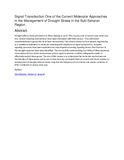| dc.contributor.author | Muoma, John | |
| dc.contributor.author | O, Ombori | |
| dc.contributor.author | M, Jesse | |
| dc.date.accessioned | 2021-06-09T07:11:02Z | |
| dc.date.available | 2021-06-09T07:11:02Z | |
| dc.date.issued | 2010-11 | |
| dc.identifier.uri | https://doi.org/10.3923/biotech.2010.469.476 | |
| dc.identifier.uri | https://www.researchgate.net/publication/49941875_Signal_Transduction_One_of_the_Current_Molecular_Approaches_in_the_Management_of_Drought_Stress_in_the_Sub-Saharan_Region | |
| dc.identifier.uri | http://ir-library.mmust.ac.ke/123456789/1665 | |
| dc.description.abstract | Drought affects maize production in Africa leading to up to 70% crop loss and in certain cases total crop loss. Several breeding interventions have been attempted with little success. Thus alternative complementation approaches have been necessitated. The current review looks at genetic engineering as a suitable complement to molecular breeding with emphasis on signal transduction. Complex signaling processes have been exploited and several genes encoding signaling factors that function in the drought response have been identified. The successfully understanding and utility of these upstream transcription factors which demonstrate various signal in adverse condition will greatly enable us effectively exploit these genes. The aim of this review is to understand the molecular mechanism and the function of these genes and to see on how best we can exploit them in current and future studies on development of drought tolerant maize crop.that the frequency of occurrence and species variation of EPNs is different in various land uses. | en_US |
| dc.language.iso | en | en_US |
| dc.publisher | Biotechnology | en_US |
| dc.subject | Signal,Transduction, Molecular, Approaches Management, Drought, Stress | en_US |
| dc.title | Signal Transduction One of the Current Molecular Approaches in the Management of Drought Stress in the Sub-Saharan Region | en_US |
| dc.type | Article | en_US |

